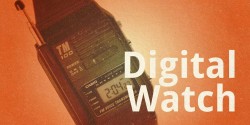The biggest news in digital and online radio in the last week was the US Patent and Trademark Office invaliding one of the key “podcast patents” which the company Personal Audio had used to sue podcaster Adam Carolla along with larger broadcast companies that also release podcasts. You can read my full report for more details.
The FCC’s Open Internet Order was published in the Federal Register on Monday, which means it’s now open season for lawsuits until June 12. On Tuesday the mobile industry trade group CTIA, the National Cable and Telecommunications Association [NCTA] and the American Cable Association, representing small cable operators, filed suit, as did telecom giant AT&T. All are protesting the reclassification of internet service as a utility under Title II, while the CTIA is also challenging the reclassification of mobile broadband.
The next step is for these cases to be consolidated and assigned to an appeals court, via lottery. The two challenges filed before the Order appeared in the Register were assigned to the DC Circuit, though no further action has been taken. Because they were filed early–the FCC argues prematurely–the Court may dismiss them, or could choose to consolidate them with the four new suits.
There continues to be Congressional mobilization against the Open Internet Order, though it’s not certain that any bill will make it all the way to the president for a signature (that it’s not likely to receive anyway). On Monday Republican Rep. Doug Collins of Georgia introduced a Resolution of Disapproval which would cancel the Order if signed into law. House Judiciary Chariman Bob Goodlatte has signed on, giving it a touch more weight. Though, with 13 sponsors so far, its rather shy of making it to the floor for a full vote. At the same time Michigan Rep. Fred Upton and Oregon Rep. Greg Walden are still working on their own net neutrality legislation to replace the FCC’s Order.
For his part, at his annual address to the National Association of Broadcasters on Wednesday, FCC Chairman Tom Wheeler told the crowd that the Open Internet Order is good for them, too. He said,
“Your goals as an important and innovative public service provider and our Open Internet goals are the same: when you want to offer something over the Internet, no one should stand in your way. Least of all, no one should stand between you and the consumers who will benefit from your service. I believe, by the way, this is equally applicable for both radio and television.”



